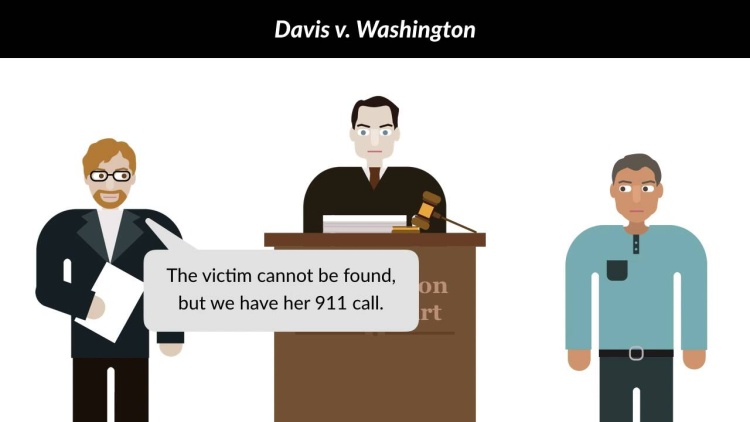Davis v. Washington
United States Supreme Court
547 U.S. 813 (2006)
- Written by Angela Patrick, JD
Facts
[Editor’s Note: This case was decided together with Hammon v. Indiana.] In Davis v. Washington, Michelle McCottry called 911 and reported that her boyfriend, Adrian Davis (defendant), was in the process of physically assaulting her. McCottry was hysterical and crying when she spoke to the 911 operator and identified Davis by his full name. Davis was charged with felony assault. McCottry had disappeared by the time of trial, so the prosecution offered the 911 call recording to prove that Davis had assaulted McCottry. Davis objected that the recording was inadmissible under the Confrontation Clause, but the trial court admitted it. Davis was convicted. The state appellate and supreme courts affirmed Davis’s conviction. In Hammon v. Indiana, police responded to a domestic-disturbance report at the home of Amy Hammon and her husband, Hershel Hammon (defendant). When the officers arrived, Amy appeared upset, but the disturbance had stopped. In response to one officer’s questioning, Amy wrote out an affidavit stating that Hershel had broken a furnace, shoved her down into the broken glass, hit her, and thrown her down. Hershel was charged with domestic battery and violating his probation. The prosecution subpoenaed Amy, but she did not appear at trial. The prosecution called the officer who had spoken with Amy to testify as to what she had said to him and to authenticate her affidavit. Hershel objected that the affidavit containing Amy’s statements violated the Confrontation Clause, but the trial court admitted it. Hershel was convicted. The state appellate and supreme courts affirmed Hershel’s conviction. The United States Supreme Court granted certiorari in both cases.
Rule of Law
Issue
Holding and Reasoning (Scalia, J.)
Concurrence/Dissent (Thomas, J.)
What to do next…
Here's why 907,000 law students have relied on our case briefs:
- Written by law professors and practitioners, not other law students. 47,100 briefs, keyed to 996 casebooks. Top-notch customer support.
- The right amount of information, includes the facts, issues, rule of law, holding and reasoning, and any concurrences and dissents.
- Access in your classes, works on your mobile and tablet. Massive library of related video lessons and high quality multiple-choice questions.
- Easy to use, uniform format for every case brief. Written in plain English, not in legalese. Our briefs summarize and simplify; they don’t just repeat the court’s language.





